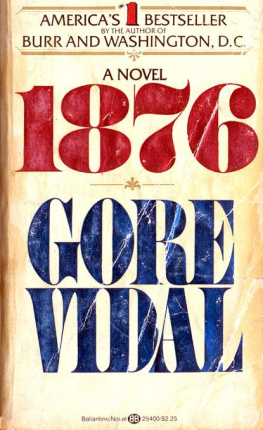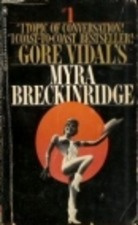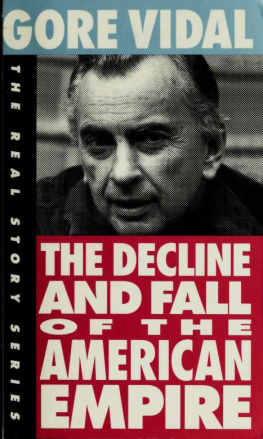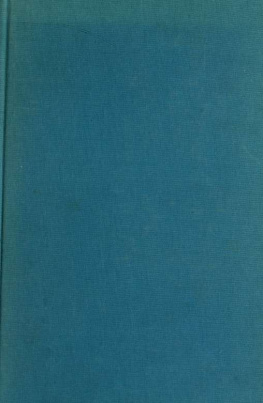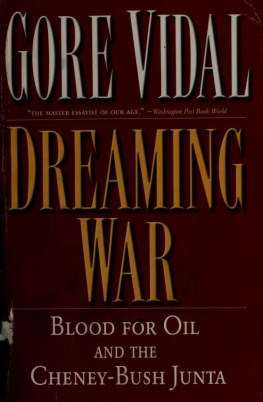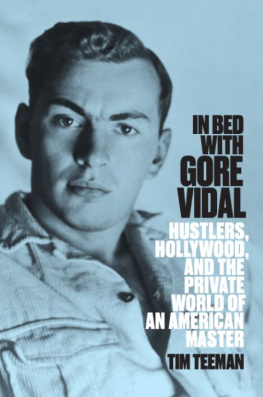

ALSO BY GORE VIDAL
Novels:
Williwaw
In a Yellow Wood
The City and the Pillar
The Season of Comfort
A Search for the King
Dark Green, Bright Red
The Judgment of Paris
Messiah
Julian
Washington, D.C.
Myra Breckinridge
Two Sisters
Burr
Myron
1876
Kalki
Creation
Duluth
Lincoln
Myra Breckinridge and Myron
Empire
Hollywood
Live from Golgotha
The Smithsonian Institution
The Golden Age
Short Stories:
A Thirsty Evil
Plays:
An Evening with Richard Nixon
Weekend
Romulus
The Best Man
Visit to a Small Planet
Essays:
Rocking the Boat
Reflections Upon a Sinking Ship
Homage to Daniel Shays
Matters of Fact and of Fiction
The Second American Revolution
At Home
Screening History
United States
Memoir:
Palimpsest
The New York Review of Books, November 5, 1987.
The Fruits of the MLA: I. Their Wedding Journey (The New York Review, September 26, 1968); II. Mark Twain (October 10, 1968).
Sinclair Lewis: An American Life (McGraw-Hill, 1961).
Guy Cardwell, The Man Who Was Mark Twain (Yale University Press, 1991). This oddly repellent work might have been more accuratelyand more modestlycalled The Mark Twain Nobody Else Knows.
A First-Class Temperament: The Emergence of Franklin Roosevelt.
As the G. W. Bush presidency begins, it looks as if Clinton was the last president, while his successor is more in the imperial Japanese mode, feeble Mikado to Cheneys all-powerful shogunate rooted in the Pentagon.
The Vanity Fair issue of December 1999 featured photographs of all the leaders as well as this text.
Central Intelligence Agency, Defense Intelligence Agency.
Yes, there are different figures for 1992 and now for 2000 and 2001. But the trend is the same: taxes on corporate profits ever down, on individuals ever up. Now the shogunate of Cheney begins. Mikado Bush attends to the tea ceremony.
A good chunk of Utah oil land was sold off in 1996.
In the election of 1996, a billion dollars apiece was spent by Clinton and Dole. In 2000, Gore and Bush spent nearly $3 billion between them.
As of 2000, USA Today reports on its front page that 6.6 million adults (3 percent of the adult population) are in prison or correction. No other society has ever done so deadly a thing to its people and on such a scale.
Italics added 2000.
When this piece was published in Russia, a number of enthusiasts elected me honorary president of the north.
This was written for Vanity Fair before the November 7, 2000, presidential election.
Repeated with the following message to the troops: And so Mr. President, elected by the Supreme Court (54), has now, in addition to a vice-president who was a former secretary of defense, appointed another former defense secretary to his old post as well as a general to be secretary of state; thus the pass was sold.
It should be remembered that J. Q. Adams complained of Thomas Jeffersons large stories. Example? Jefferson claimed to have learned Spanish in nineteen days aboard a transatlantic ship.

PUBLISHED BY DOUBLEDAY
a division of Random House, Inc.
1540 Broadway, New York, New York 10036
D OUBLEDAY and the portrayal of an anchor with a dolphin
are trademarks of Doubleday, a division of
Random House, Inc.
Book design by Donna Sinisgalli
Library of Congress Cataloging-in-Publication Data
Vidal, Gore, 1925
The last empire: essays 19922000 / Gore Vidal. 1st ed.
p. cm.
I. Title.
PS3543.I26 L37 2001
Copyright 2001 by Gore Vidal
All Rights Reserved
*
eISBN: 978-1-4000-3299-0
v3.0
PART IV
*
* S HREDDING THE B ILL OF R IGHTS
Most Americans of a certain age can recall exactly where they were and what they were doing on October 20, 1964, when word came that Herbert Hoover was dead. The heart and mind of a nation stopped. But how many recall when and how they first became aware that one or another of the Bill of Rights had expired? For me, it was sometime in 1960 at a party in Beverly Hills that I got the bad news from the constitutionally cheery actor Cary Grant. He had just flown in from New York. He had, he said, picked up his ticket at an airline counter in that magical old-world airport, Idlewild, whose very name reflected our condition. There were these lovely girls behind the counter, and they were delighted to help me, or so they said. I signed some autographs. Then I asked one of them for my tickets. Suddenly she was very solemn. Do you have any identification? she asked. (Worldly friends tell me that the premise of this story is now the basis of a series of TV commercials for Visa, unseenby me.) I would be exaggerating if I felt the chill in the air that long-ago Beverly Hills evening. Actually, we simply laughed. But I did, for just an instant, wonder if the future had tapped a dainty foot on our mass grave.
Curiously enough, it was Grant again who bore, as lightly as ever, the news that privacy itself hangs by a gossamer thread. A friend in London rang me this morning, he said. This was June 4, 1963. Usually we have code names, but this time he forgot. So after he asked for me I said into the receiver, All right. St. Louis, off the line. You, too, Milwaukee, and so on. The operators love listening in. Anyway, after we talked business, he said, So whats the latest Hollywood gossip? And I said, Well, Lana Turner is still having an affair with that black baseball pitcher. One of the operators on the line gave a terrible cry, Oh, no!
Innocent days. Today, as media and Congress thunder their anthem, Twinkle, twinkle, little Starr, how we wonder what you are, the current president is assumed to have no right at all to privacy because, you see, its really about sex, not truth, a permanent nonstarter in political life. Where Grants name assured him an admiring audience of telephone operators, the rest of us were usually ignored. That was then. Today, in the all-out, never-to-be-won twin wars on Drugs and Terrorism, two million telephone conversations a year are intercepted by law-enforcement officials. As for that famous workplace to which so many Americans are assigned by necessity, the daily abuse of civil liberties... is a national disgrace, according to the American Civil Liberties Union in a 1996 report.
Among the reports findings, between 1990 and 1996, the number of workers under electronic surveillance increased from 8 million per year to more than 30 million. Simultaneously, employers eavesdrop on an estimated 400 million telephone conversations a yearsomething like 750 a minute. In 1990, major companies subjected 38 percent of their employees to urine tests for drugs. By 1996, more than 70 percent were thus interfered with. Recourse to law has not been encouraging. In fact, the California Supreme Court has upheld the right of public employers to drug-test not only those employees who have been entrusted with flying jet aircraft or protecting our borders from Panamanian imperialism but also those who simply mop the floors. The court also ruled that governments can screen applicants for drugs and alcohol. This was inspired by the actions of the city-state of Glendale, California, which wanted to test all employees due for promotion. Suit was brought against Glendale on the ground that it was violatingthe Fourth Amendments protection against unreasonable searches and seizures. Glendales policy was upheld by the California Supreme Court, but Justice Stanley Mosk wrote a dissent: Drug testing represents a significant additional invasion of those applicants basic rights to privacy and dignity... and the city has not carried its considerable burden of showing that such an invasion is justified in the case of all applicants offered employment.




